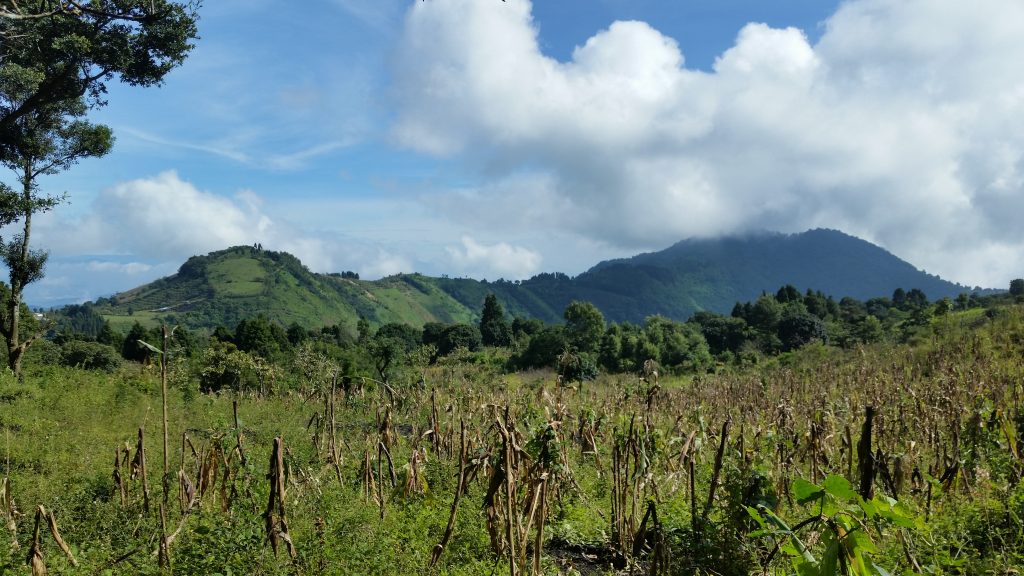Dr. Gary Austin gets emotional when he talks about his Doctor of Physical Therapy students and the work they do in Guatemala. “It’s really awesome,” Dr. Austin, a professor at University of Lynchburg, said. “I get choked up because it’s so beautiful. They love people, care for them. It’s just awesome. I love what I do. It’s the highlight of my year.”
Dr. Austin has been taking Lynchburg students to Antigua, Guatemala, twice a year — spring and fall breaks — since 2016. The mission trips are coordinated through a church in Antigua, Iglesia del Camino, which translates from Spanish as “Church of the Way” or “Church of the Road.”
“They have well-established connections in the community surrounding the town we’re headquartered in,” Dr. Austin said. “They basically have a sense of what the needs are and use us to fulfill those needs. They arrange for us to do medical clinics with a local physician, who volunteers his time to help us.”
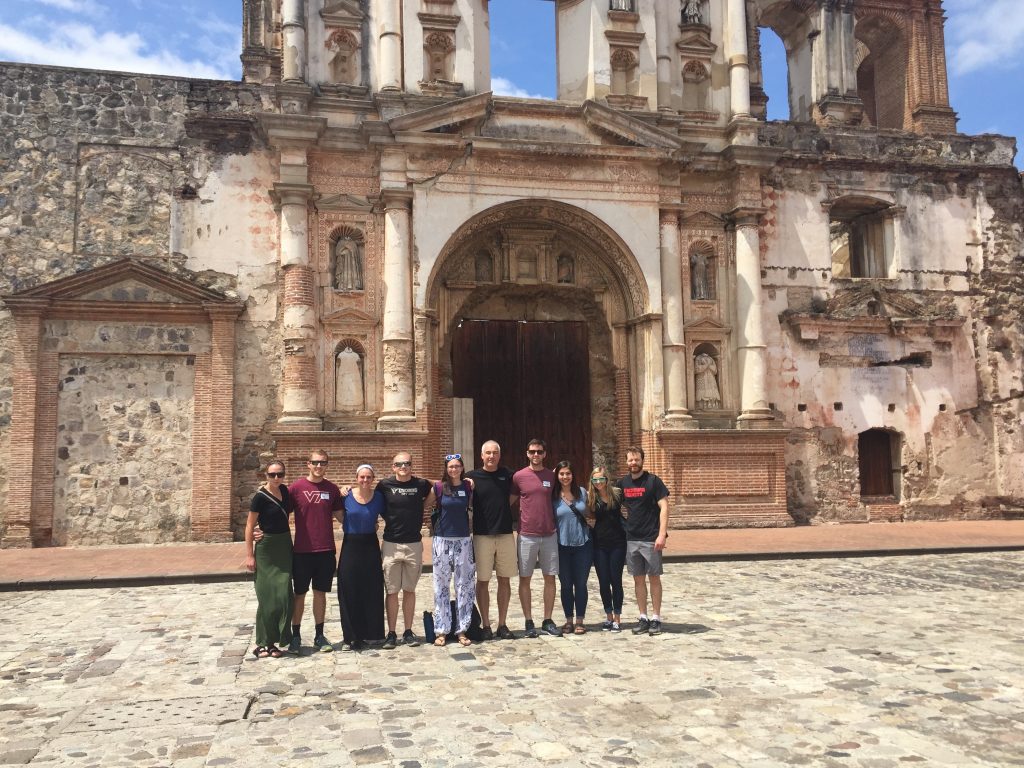
Over the recent fall break, Dr. Austin and his students held clinics in three villages near Antigua — Pastores, Ciudad Vieja, and Santa Maria de Jesus. The clinics were held in municipal buildings and most of the patients, adults and children, arrived on foot. To meet the needs, the students sometimes worked 12- to 13-hour days.
Iglesia del Camino provided Spanish translators and transportation, and when the students arrived back at their base each night they were greeted with home-cooked meals “Our team was so wonderful,” third-year DPT student Lauren Bray said a few days after returning to Lynchburg.
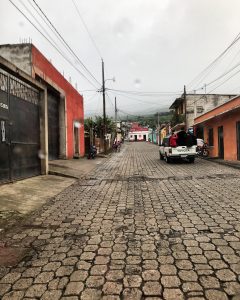
“Our translator was so committed to helping us in any way they possibly could. For translating, your brain never stops. You have to be attentive. We could tell by the end of the day, they were exhausted. They’re so committed to what they’re doing because they knew we were helping them. We couldn’t have done it without them.
“After we got home, we had dinner waiting for us, delicious food. The cook was so kind. One night he said, ‘I just love watching people enjoy my food.’ You could tell they were doing it for us and the greater good. They were just awesome people.”
Asked about the physical therapy needs they saw in the villages, Dr. Austin said it was “pretty consistent” with past visits. “A lot of low back pain and leg pain and neck and arm pain, from physical labor,” he said. “Interestingly enough, that’s pretty consistent in Central America.
“A lot of the burden falls on the women. They’re expected to have babies, take care of the house, work. They’re up early, bringing water, doing laundry, cooking, caring for their large families. We saw lots of women.”
The DPT students also saw lots of children, many of whom had conditions related to unclean drinking water. “We see a lot of abdominal issues due to waterborne illnesses,” Dr. Austin said. “Lots of kids with digestive issues. We identify that and consult with the physician that works with us, Dr. Jacobo Pineda. He’s wonderful.”
To help combat this problem, the DPT students provided five Guatemalan families with water filters. The first-, second- and third-year DPT classes each raised money to provide at least one water filter for the fall trip.
Dr. Austin compared the $45 filters to a bucket, through which water — often taken from streams — is filtered into another container and made safe for drinking. “Providing clean water is a huge gift to these folks,” he said. “It changes their health status and affects the whole family.”
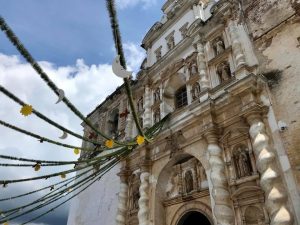
Through the water filters, the group also was able to convey a spiritual message. “The church trained us on how to set it up and what to say,” third-year student Sarah Buwalda said, referring to host church Iglesia del Camino. “When setting it up, we had them put the water they had been using in the filter. The church also told us to grab some dirt from the ground and put it in as well, and show them how whenever the water goes through the filter it’s completely clean.
“We explained how the water with the dirt is kind of like your lives without the Lord. You had been drinking it. It’s kind of OK, but not the best idea. Just how, when we connected the filter, that’s Jesus and how he came and died on the cross [and] completely cleaned and purified us. It represents our lives with the addition of the Lord and how we’re completely pure and clean.”
While in Guatemala, the DPT program also worked with a ministry called Hope Haven to provide wheelchairs for five of the patients they saw. Over the past 24 years, Hope Haven has distributed nearly 130,000 wheelchairs to people all over the world. They have a factory in Guatemala.
Lynchburg’s DPT students and the program’s student organization, Global Outreach Service Club — “GO Serve Club” for short — raised $1,000 for the five wheelchairs. One wheelchair went to a young girl that Bray remembers as “the sweetest and sassiest thing in the world.”
“The moment she saw the chair, she was telling us, ‘Hurry up!’ She wanted to get in the chair,” Bray said. “She got in the chair and kept unlocking the brakes and would keep trying to move it. They said, ‘Hold on, we have to finish fitting it for you.’ The moment [they finished] she was just off. It was her first wheelchair. It was so cool to see.”
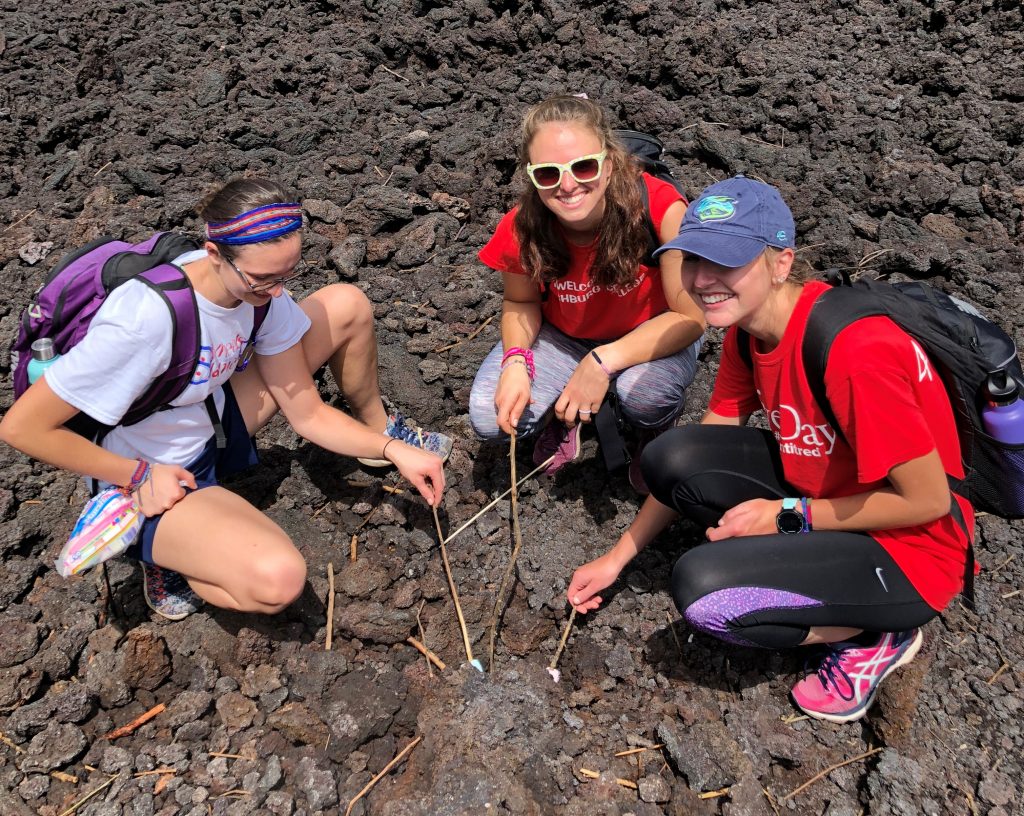
There were moments of humor as well, such as Katie O’Malley’s experience while treating an older male patient. “I don’t know a lot of Spanish,” O’Malley, a third-year student, said. “One of my goals was to learn some more while I was there. On the first day, we had a patient and I was trying to tell this patient to do an exercise 10 times.”
What O’Malley didn’t know was that she’d asked the patient to kiss her 10 times. “He was so kind,” she said. “He just giggled. ‘The poor girl.’ But I learned my lesson.”
While the DPT program has an official program through which students do about 4,000 hours of community service and 2,000 hours of professional involvement each year, the Guatemala trips are not part of it. There’s no class credit and the trip cost — about $1,500 per student — is raised through crowdfunding and by churches, the students, and the students’ families.
The group also raises money and accepts donations for stuffed animals, soccer balls, children’s sneakers, lip balm, and multivitamins. “The kids can’t go to school if they don’t have sneakers,” Dr. Austin said. “We tend to look for smaller sizes of shoes to bring with us.”
Third-year student Nicole Pandak, who has been on similar DPT mission trips to the Caribbean island of St. Lucia, called the Guatemala trip “life changing” and said, “It gave us a wonderful opportunity to go over and not only use our skills we’ve learned in the program but to meet people where they are in their lives. For me, that was the most impactful.
“I might not have had the most impact on them. I might not have been able to touch them the same way they touched me. To use the skills we learned [at Lynchburg] and incorporate a spiritual aspect as well, and be with people and learn about the people and the culture, it was really just life changing overall.”
To learn more about the DPT students’ experiences in Guatemala, watch this video.
